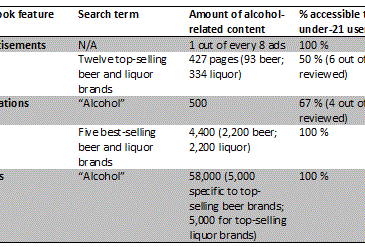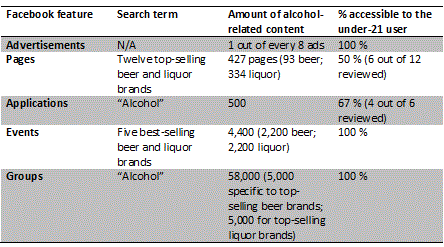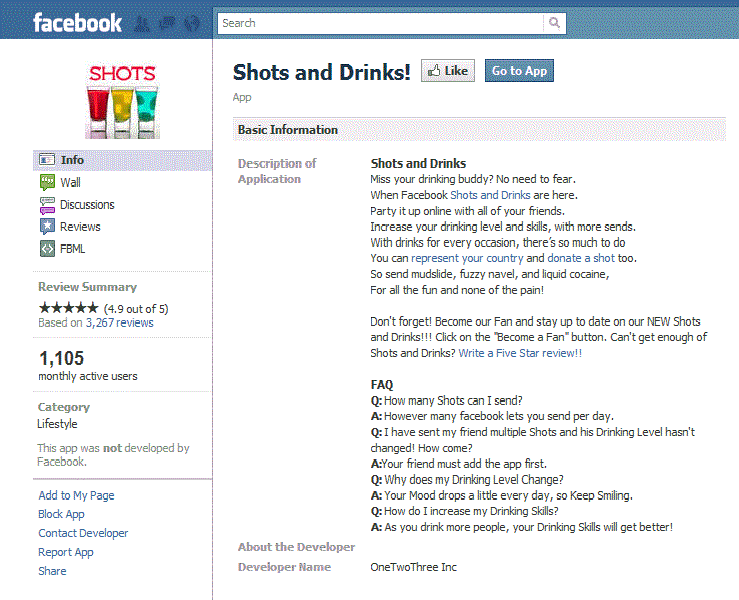Alcohol exposure, especially through social media marketing, is a risk factor for early underage drinking initiation (Gordon, MacKintosh, & Moodie, 2010). Using social media to market alcohol also is associated with increased alcohol consumption among underage drinkers (Anderson, de Bruijn, Angus, Gordon, & Hastings, 2009). Despite Facebook’s solicitation of paid product advertising, as well as its efforts to expand users from individual college students to high schoolers (Mart, Mergendoller, & Simon, 2009), the literature examining alcohol content and underage drinking on Facebook, the most popular of social networking sites, is surprisingly scarce. This week’s issue of Addiction & the Humanities reviews findings from a recent qualitative survey (Mart et al., 2009; adapted in CESAR FAX, 2011) and discusses the implications of this study for youth, the alcohol industry, and Facebook.
Methods
- Mart et al. created two fake Facebook user profiles—one 21-year old user and one under-21 user—and searched the following 5 Facebook features for each users’ access to alcohol-related content:
- Ads: Companies buy ad space and access Facebook users’ profile information to target online advertisements.
- Pages: A profile page of an organization or a particular product, as opposed to an individual’s personal page.
- Applications: Third party developed features including games and quizzes (See Figure 1 for an example).
- Events: This feature allows individual Facebook users and businesses to create a page to inform people of the time, location, and purpose of a particular event and to invite people as well.
- Groups: This feature is a page that can be created by any Facebook user about any topic of interest. When a user joins a particular group they are listed as a member of that group.
- For each Facebook feature, the investigators separately entered search terms for the 10 top-selling beer brands (e.g., “Budweiser”, “Miller Lite”, “Natural Lite”), the 10 top-selling hard liquor brands (e.g., “Smirnoff”, “Bacardi”, “Captain Morgan”), popular youth brands (e.g., “Malibu” and “Mike’s Hard Lemonade”), and alcohol-related terms including “alcohol”, “binge”, “shots”, and “nightlife”.
Results
- Table 1 displays the study’s results regarding underage (i.e., <21 years) exposure to alcohol content. In brief, the under-21 user was able to access nearly all of the alcohol-related content searched on Facebook. The vast majority of this content was not available through sponsored advertisements; instead, this material was accessible through Facebook’s other less regulated features (e.g., Events and Groups).
Table 1- Underage access to alcohol-related content by Facebook feature
Figure 1. Facebook Application: "Shots and Drinks!"
Limitations
- This study was not a systematic empirical study. Hence, its findings are limited to Facebook and might not generalize to other social media.
Conclusions
The results of this review suggest that Facebook is falling short of its own alcohol policies. Consider the following provision outlined in its Advertising Guidelines, which states that “all viewer restrictions for alcohol-related Facebook Pages must be set at twenty-one years or older” (Facebook.com). Mart et al. found various loopholes in the Applications, Pages, Events, and Groups features of Facebook that permitted the underage user almost full access to alcohol-related content. Such features allow for individuals to be in charge of posting content; thus, the majority of Facebook’s alcohol-related content is not paid advertising and is subject to very few guidelines. Furthermore, the open nature of these components has rendered it nearly impossible to determine who actually is posting what content. Consequently, “the line between corporate advertising and user-generated content is almost completely blurred” (Mart et al., 2009). This situation presents an even greater challenge to the successful enforcement of age restriction policies. However, because media exposure is a determinant of young adults’ early initiation of substance use which, in turn, predicts a variety of subsequent substance-related problems among this group (e.g., dependency, mental health problems, lower academic performance, unprotected sex, etc.), it is crucial for alcohol and drug policy-makers to take into account the issues of control and accountability for posting substance-related content online, and for Facebook to enforce viewer restrictions relevant to many of its features beyond paid advertisements.
-Brittany Bannon
What do you think? Please use the comment link below to provide feedback on this article.
References
Anderson, P., de Bruijn, A., Angus, K., Gordon, R., & Hastings, G. (2009). Impact of Alcohol Advertising and Media Exposure on Adolescent Alcohol Use: A systematic review of longitudinal studies. Alcohol and Alcoholism, 44 (3), 229-243.
CESAR FAX (February 28, 2011). Alcohol-Related Content Pervasive on Facebook; Most Accessible to Underage Users. A Weekly FAX from the Center for Substance Abuse Research (CESAR), 20 (8). Retrieved 10, May 2011 from < www.cesar.umd.edu >.
Facebook.com [Internet]. Palo Alto: Facebook Advertising Guidelines. [Updated 2009 Jul 29]. Retrieved 17 May, 2011 from <http://www.facebook.com/terms.php?ref=pf#/ad_guidelines.php>.
Facebook.com [Internet]. Palo Alto: OneTwoThree Inc., Shots and Drinks! Application. Retrieved 10, May 2011 from <http://www.facebook.com/apps/application.php?id=14319026863#!/shotsanddrinks?sk=info>.
Gordon, R., MacKintosh, A. M., & Moodie, C. (2010). The Impact of Alcohol Marketing on Youth Drinking Behaviour. Alcohol and Alcoholism, 45 (5), 470-480.
Mart,S., Mergendoller, J., & Simon, M. (2009). Alcohol Promotion on Facebook. The Journal of Global Drug Policy and Practice, 3 (3). Retrieved 10, May 2011 from <http://globaldrugpolicy.org/3/3/1.php>.







Sue June 15, 2011
Nicely Done